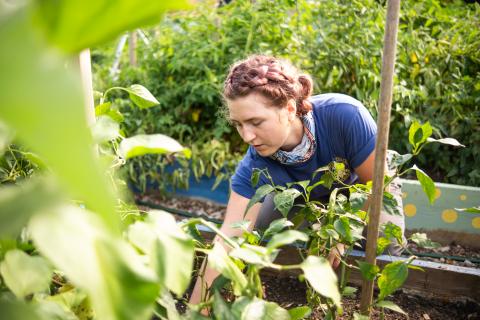Students Sustain a Community Garden
For co-coordinator and others, work means gardening, organizing—and bees.

Growing up in Singapore, Ankitha Kannad ’19 knew urban spaces. But then she went to boarding school in rural India and discovered her appreciation for nature. It was that experience, she says, that “gave me the understanding of why preserving the environment is important.”
Kannad—a rising junior and physics major—was a quick study. In India, she participated in activities aimed at preserving a biosphere reserve at her school and during a gap year before college, conducted wildlife research for an environmental group. And at Bryn Mawr, Kannad found a place where she could continue fostering her passion for the environment and sustainability: the community garden.
As a co-coordinator of the community garden with Alison Aguiar '17, Kannad gardens but also organizes workshops, field trips, and volunteer days; works with the sustainability leadership group; and donates produce to the Eldernet food pantry. Established in 2010 and managed by staff member Vippy Yee, the garden is a volunteer program sponsored by the Leadership, Innovation, and Liberal Arts Center (LILAC).
“I am very much a beginner at it,” says Kannad. “I only started gardening at Bryn Mawr.” She uses the summers to learn new gardening techniques, like organic farming and her most recent challenge: bees.
“We really wanted to get a beehive on campus and make it part of the community garden because bees are such important pollinators,” she says.
Working with Haverford's official beekeeper Eli St. Amour, LILAC got a human-made beehive called a Flow Hive (which precludes the need to smoke the hive come harvest time) and a local species of bees from a nearby Amish farmer. “The bees come with the queen and the other types of bees—drones and worker bees—a colony needs,” Kannad explains. “When they start building honeycombs, you know they’re settling in.”
St. Amour has been training Kannad, a handful of other students, and staff members on apiary care. “The honey will be like the produce from the community garden: people can use it,” says Kannad. “But I think the more important thing is teaching people about why bees are important—and also benefitting the campus ecosystem.”
And, she adds, their value extends far beyond campus. “In a lot of countries, bee populations are declining because of habitat loss and intensive pesticide use. They're important pollinators, and their decline could have a huge impact on agriculture and biological diversity.”
For Kannad, the community garden and the beehive offer her fellow students a hands-on way of connecting to the natural world. “People sometimes don’t feel very attached to nature,” she observes, and so the environment can seem like a remote concern.
“But gardening is a tangible way of enjoying nature.”
Published on: 09/18/2017